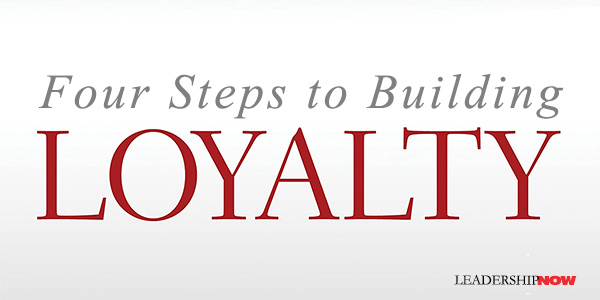 |
 |
01.27.10

Four Steps to Building Loyalty
LOYALTY is a critical subject for leaders. As builders of community, we can’t function without it. Successful organizations are built on relationships. Leadership is all about relationships. But how important is modeling loyalty in everything you do? It is hard to talk about sustainability, community, personal responsibility, and relationships without talking about loyalty. Yet we do.Loyalty has become a commodity that we hold or withhold—a tool to vote with—a means to express our discontent on a whim. Abiding commitments are seen as old-fashioned. Impatience, irritability and selfishness all drive the need to look for greener pastures. “In a strange way,” said Jack Valenti, “loyalty is now seen as some kind of character flaw.” In Why Loyalty Matters, authors Timothy Keiningham and Lerzan Aksoy write: The possibility of leaving applies to some degree to our relationships with everyone. Weak friendships, dysfunctional families, bad marriages, intolerant religious institutions, and inept governments all face the prospect of abandonment. And there are indeed times when leaving is the best option. Loyalty is about making commitments to causes, people, and ideas through thick and thin, for better or for worse. It is about service to something greater than ourselves. Keiningham and Aksoy define loyalty as “accepting the bonds that our relationships with others entail, and acting in a way that defends and reinforces the attachment inherent in those relationships.” Loyalty is implicit in all relationships, and the lack of it is eroding our sense of well-being and happiness. Our priorities are often misplaced. They write, “The problem isn’t that we are exchanging our time for commodities, but instead we are exchanging our family’s time, our friends’ time, our ideals’ time to get something.” Of course, we like to see ourselves as more loyal than we are and everyone else as less loyal than they really are. But, “it is our unwillingness to see our own role in the general decline of loyalty that is a major cause of relationship disintegration. And this disintegration ultimately leads to our unhappiness.” Long-term thinking helps to develop loyalty. Professor Richard Sennett observed, “‘No long term’ is a principle which corrodes trust, loyalty, and mutual commitment … social bonds take time to develop, slowly rooting into the cracks and crevices of institutions.” Leaders are hard-pressed to function without it. We develop and model loyalty in the seemingly small choices we make every day. “If loyalty is to be an important part of our lives, then we must become aware of the ramifications of our decisions. Living a loyal life requires that we recognize the formal and implicit commitments we have made to others. We must then make deliberate choices to strengthen our bonds by honoring our commitments.” The authors suggest a process they call P2R2. It stands for: Pinpoint Where You Are: Where do you stand? We believe we are far more loyal than the recipients of our loyalty believe us to be. Prioritize Those Things That Matter: If we want to make loyalty a meaningful part of our everyday existence, then we need to understand where we are actually spending our time and then prioritize. Reinforce Your Connections: Actively schedule time to connect with those to whom we owe loyalty. “It will mean that there will be times we must sacrifice doing things that would be more fun to help a friend in need.” Reach Out To Others: Engage beyond your friends and family. “It says, this relationship, this institution, this cause is mine, and I will not abandon it.” Why Loyalty Matters delves deeply into the issue of loyalty. They discuss the economics of loyalty, the problem of misplaced loyalty, faith and loyalty, and an important chapter on teaching loyalty. President Theodore Roosevelt warned, “To educate a man in mind and not in morals is to educate a menace to society.” Oprah Winfrey sums up the need well: “Lots of people want to ride with you in the limo, but what you want is someone who will take the bus with you when the limo breaks down.” 
Posted by Michael McKinney at 03:12 PM
|
BUILD YOUR KNOWLEDGE
 

How to Do Your Start-Up Right STRAIGHT TALK FOR START-UPS 
Grow Your Leadership Skills NEW AND UPCOMING LEADERSHIP BOOKS 
Leadership Minute BITE-SIZE CONCEPTS YOU CAN CHEW ON 
Classic Leadership Books BOOKS TO READ BEFORE YOU LEAD |